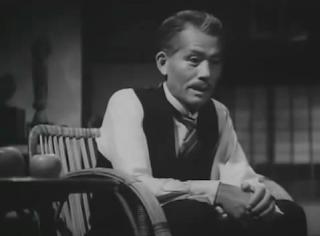Chishū Ryū did not receive an Oscar nomination for portraying Shuhei Horikawa in There Was a Father.
There Was a Father tells the story of a single father raising his son, however rare is it that he finds time to spend with him regularly.
Frequent collaborator of director Yasujirō Ozu, Chishū Ryū stars here and it is no surprise that he was so frequently cast as Ozu seeks the simple truths of life, Ryū's a performer who does the same with his wholly sincere and always authentic feeling presence. This is a film on the surface that is very muted, yet in that muted tone is what is so special, and what we also find within the ending of the film. For much of the film we follow Ryū's Shuhei as he raises his son with a simple dignity, however within the simple dignity of Japanese culture of the time where he must uphold certain values of consistent hard-work over the natural needs of familial connection. What then is the film as we follow the ease in which Ryū's creates really the conflict with this without actually ever denoting it towards more expected melodrama or even drama really. Ryū's delivery after all is one of calmness as he explains each time to his less understanding son of why the two must be so frequently separated, as he must pursue work while also having his son be raised. The two's presumed duties leaving them in this state of perpetual separation through the years. This as this film is one through years not days, a week or a month. We rather see the long extension of this practice as the father does what he believes is right by his son, and right by his family, which is two so commonly not be among him. As off-putting as this even seems as though it may be Ryū's performance is what makes it work, and creates this understanding within the logic of the father.
Ryū's delivery is of a calm passion towards the belief and speaks it as an expected truth. It is with a calm duty and an unassuming belief. It isn't something that he has randomly come up with, rather with Ryū he speaks it as though it was just speaking towards any responsbiltiy one would just assume is part of life. I am honestly surprised Ozu was able to get away with this film during World War II in Japan, given what for example Kurosawa's typical individualistic spirit was reduced to in The Most Beautiful. Although it is perhaps because while the text says one thing, and perhaps that is all potential government officials really read into this piece, this being that one should work hard in life, the subtext seems to indicate otherwise. Although Ryū's Shuhei repeatedly speaks one's devotion to work. That though would be ignoring the whole of it, which is every silent moment within Ryū's work. This as even as he doesn't speak his love towards his son, as they interact when he's a boy, to when he's a young adult, to an adult, but it is ever apparent in every moment of interaction in Ryū's performance. The happiness within Ryū's portrayal is of pure warmth when the two go fishing together or just speak towards one another in their home. It is with a gentle love that is simply the truth of their relationship. There is a sense of conflict in Ryū's performance even though it is never something that is emphasized specifically. It is rather within how much appreciation and pride we see in Ryū as he has his moments with his son. There are no moments where there is a more powerful sense of happiness then in these scenes. Again though the beauty of this work is that it is in the briefest of moments, such as his son attending to the shrine of his mother, we in just a look Shuhei's deep affection for his wife, and the love for his son in a singular moment. We see this as a truly loving father who embraces every moment of being a father with his son, while always being trapped within the beliefs of societal expectation. Again this where one could argue quite the subversion, as the true happiness of Shuhei's life and as expressed within Ryū's performance is when the father and son are reunited, not when he is elsewhere. Again though this is never spoken within the film rather in the silence, where there is the truth of it all. In turn we are also granted the classic devastating ending from Ozu that hits you in a way that is most unexpected, yet so palatable when it does. This isn't through theatrics however, it is rather through that calm. Here in really understanding this relationship, and seeing every intimate moment of connection, so wonderfully realized here by Chishū Ryū. We find the loss of the two's time apart not from a big speech to say this, but rather through every gentle reminder that the father and son simply love one another. Ryū's work not defined by every big scene, rather every quiet moment that reveals the moving intimate truth of this reserved man.









